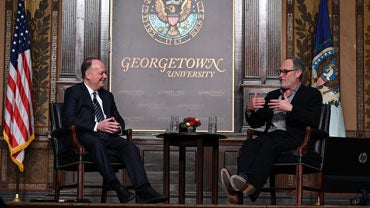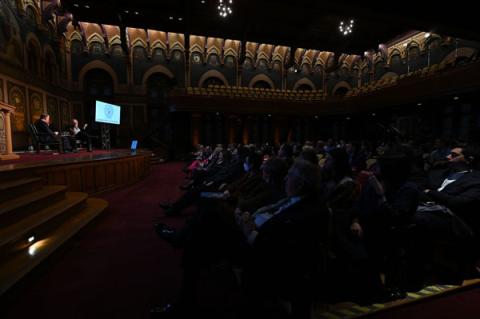
Jon Turteltaub, director of Hollywood blockbusters including National Treasure, Cool Runnings, While You Were Sleeping, and The Sorcerer’s Apprentice, spoke with Georgetown President John J. DeGioia on Feb. 27 at Georgetown University Library’s 2023 Tanous Family Endowed Lecture in Gaston Hall.
During their conversation, Turteltaub shared the spark that got him into directing and producing and announced that the next National Treasure 3 is in the works. He also discussed his charitable efforts, which include funding an orphanage in Kenya, rehabilitating child soldiers in Uganda, advising Represent.Us and serving on the board of the Inner-City Filmmakers Program.

Turteltaub was featured as part of the Tanous Family Endowed Lecture series, established by Peter J. Tanous (C’60) in 2010 in honor of Lauinger Library’s 40th anniversary that supports an annual lecture program. Previous speakers have included current U.S. Secretary of the Treasury Dr. Janet Yellen, Nobel Laureate in Economics and McCourt School of Public Policy Professor George Akerlof, former U.S. Secretary of Transportation Ray LaHood, and last year’s speaker, former U.S. Secretary of Defense Robert M. Gates.
In this Q&A, excerpted from their conversation, learn more about the next National Treasure, how a liberal arts education enhances his filmmaking, and why he finds TikToks brilliant.
You can also watch the full video to learn about Turteltaub’s thoughts on working with celebrities like Nicolas Cage, why movie theaters will inevitably close, and where the next National Treasure 3 may be shot.
John J. DeGioia: What an extraordinary body of work. How do you decide which ones you want to do?
Jon Turteltaub: My first thing is to look for something I didn’t do already. The more successful directors tend to do the same kind of movie a lot. That always bored me. I just wanted to do every kind of movie I’ve ever liked and see if I could do it.
If the script is smarter than I am, I love it. If I read something [and think], who would have thought of that? I feel like I’m directing up to that. I feel like I know I can do that story. I’d be good at that. Unlike a lot of directors, I actually think about whether the movie is going to make money or not. It’s just awful to make a movie nobody sees. It feels terrible. You feel like such a loser. You want that praise, at least that attendance after you put in all that effort. It should matter a little bit.
There is a very good possibility of a National Treasure 3 being very close, and doing that again.
DeGioia: Georgetown didn’t make it into National Treasure 1 or 2. Doesn’t this resonate?
Turteltaub: This would be a great place to shoot now that I think about it. What drove me nuts in my bad reviews for National Treasure—not that I read any of them—was when they say how fake and phony it is and how made-up it was. It’s amazing how much wasn’t made up.
We did our research, and turned what we saw into story. We always wrote what could be possible based on what we learned, and those ideas came from anywhere. I was looking underneath Trinity Church into the basement just to see what was there, and there are crypts, these archways with coffins in them and bones exposed. And in the next crypt was kids’ bones. And in the next crypt was cleaning supplies. If I had just done that, they would’ve said I made it up.
DeGioia: National Treasure has special resonance for all of us in Washington. You gave Charles Carroll, the cousin of Georgetown’s founder, a shout-out in the movie. How did you come to engage that?
Turteltaub: The first thing we said was, who was the last signer [of the Declaration of Independence] to die? Because that person would take the secret with them. It was Charles Carroll. And then you find out these little details, and start filling in the blanks and bring life to it. My big push at first was: All those great adventure treasure hunt movies, why are they always in exotic foreign places? There’s an assumption that America doesn’t have history. We said, let our history be that interesting and have secrets. Every studio executive said the Revolutionary War is boring, that nobody cares about that era. But boring teachers teach boring classes, and great teachers teach great classes, and I thought, I could be a better American history teacher. Movies can teach really well. So let’s make it exciting. Let’s get kids to love history. And it worked.
DeGioia: What sparked your interest in filmmaking? What did you learn early on that made you want to consider it?
Turteltaub: I saw Hollywood and show business as respectable. I met awesome, interesting people who were succeeding in life. Show business is also very appreciative and respectful to what has come before them. We honor what brought us to this point. And I loved that. I thought the glamor was cool and I was so non-cynical and idealistic. And then when you make someone laugh—oh my God, what a feeling. It’s the greatest. Especially if you’re neurotic and a little narcissistic. When you’re insecure, that stuff’s gold. I only care what other people think!
I didn’t really know what a movie director was. I studied theater because I thought I’d become an actor. I was doing A Man for all Seasons. I played Sir Thomas More, and when I was on stage, playing this 63-year-old man when I was 18, I knew where the light was off, where the other actor wasn’t standing where they were supposed to. I was not in it. I was not Nic Cage-ing this experience. I was outside, kind of directing the whole thing while I was on stage, and I realized that was more my thing. I decided to go to film school. I liked it, and I was good at it. So I did it.
DeGioia: What role did a liberal arts education play?
Turteltaub: I tell people, don’t study film, because if you only study film, you have nothing to make a film about it. Study history, read books, learn about the world, and now you have something to make movies about. You’re not going to learn about people by being in a play. Learn about people by breaking up with someone and getting fired from a job and all that.
All the classes I remember most were the classes not in my major. I really wish there was a degree called liberal arts, where you graduate knowing stuff about everything. Because when you go out in the world, you need to know about everything. Yes, when you graduate, you’re 22, and you take any job you can get, and you try to figure out life, and it seems like all that other stuff was a waste. But as you keep going, you keep encountering things in life, and that astronomy class suddenly shows up when your kid asks about the comet that just came by. I think liberal arts is the education everyone needs.
Audience Questions
Tori Philips: I’m a member of the executive education team at the School of Business. What of your experiences as a director of feature films has impacted the work that you do in Africa? What have you learned that affects the charity that you execute?
Turteltaub: Making movies makes you hopefully better at communicating. You understand how to talk to people and change minds and tell stories as a way of doing that. I also think observing, listening, and seeing details [are critical]. The best characters in the movies are real because of the details that blossom and take over the whole thing.
If you see the details, and you see that the more important part of this story is not the battles but what’s going inside each of those kids and each of those soldiers and each of those people. I know it’s true in a way from when you go to the movies, you are following that character and what she wants and you immediately connect to that person, because she’s exposed herself or shared something vulnerable. You look at these people, and it’s not just the kid with the machine gun, it’s also the war lord who gave it to him—he’s got stuff going on too—and I may be able to stop him by shooting him in the face, or I may be able to stop him by helping him become human again. So you look for all those solutions.
Andrew Edghill: I’m a graduate student. Can you talk through creative decisions that you made on a shorter budget, when the crew who may not have been paid or been paid scale?
Turteltaub: The good news is—I think it’s an Orson Welles quote—a lack of restrictions is the death of an artist. You can’t create with no restrictions. The blank page is impossible. Thank God a canvas has borders. Those restrictions guide you and push you in a direction.
What an obstacle in life gives you is a chance to be a hero. When something goes wrong, the only option available is for you to be the freaking hero. So you endeavor with joy to overcome that stuff and the victory’s sweeter. You’ve got to work within the world you have. So if you only have this much money, only spend that. Create something that will fit in there. You guys are already too young for Vines, but there are brilliant TikToks—15 seconds—that’s awesome.
You can tell a story and get a great response, an emotional response, and it’s shot on someone’s phone in their mom’s kitchen. Those restrictions get bigger when you’re trying to go beyond them. Use your restrictions.
